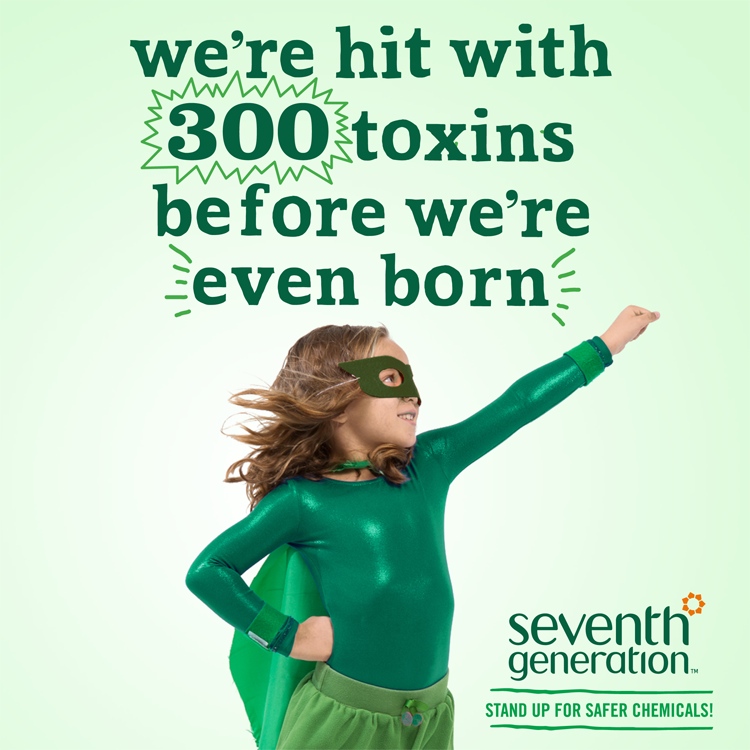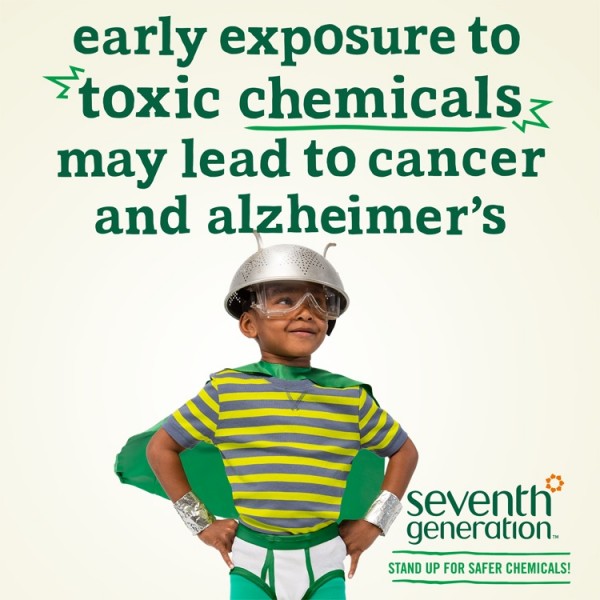If we are going to live so intimately with these chemicals
eating and drinking them,
taking them into the very marrow of our bones—
we had better know something about their nature and their power.
-Rachel Carson, Silent Spring
* This post is sponsored by Seventh Generation through Mom Bloggers for Social Good.
All opinions are my own.*
Rachel Carson was talking about pesticides, but it doesn’t stop there. There are over 80,000 chemicals on the market in the US that have never been fully tested for toxicity. We’re talking in our kids’ toys, in our furniture and fabrics, in our electronics and car interiors, in our food and beverage containers, in our building materials. In the products we use to “clean” our houses and “wash” our clothes and dishes. In the shampoos we use on our hair, the lotion we rub into our kids’ skin. It’s mind-boggling.
How is this even possible? The Toxic Substances Control Act (TSCA) grandfathered in 62,000 chemicals when it was enacted, and over 20,000 been added since. (And that number is steadily growing. Thousands have been added since the first time I wrote about this on a newly launched blog, eight years ago.) The EPA has only required testing for about 200 of those chemicals (that’s less than 10%), and has partially regulated only five.
FIVE.
The Toxic Substances Control Act was passed in 1976.
News flash: I was born in 1976. And trust me, I am no spring chicken.
Not only have these chemicals not been fully tested, but we have no real concept of the effects of prolonged exposure, the potential dangers of how they break down over time or when they react to each other. Some chemicals are persistent, building up for years, decades even, moving up the food chain and into our bodies.
Babies are being born carrying a body burden of 300 toxins. Research indicates that exposure to even low doses of certain chemicals, especially in the womb or during early childhood, can affect our hormonal, reproductive, and immune systems. Rates of allergies, asthma, learning disabilities, birth defects, neurological disorders, cancers and more rise all the time. Even obesity may have chemical ties.
Whether or not you’re willing to make the jump to direct causation, I think we can all agree that it’s time for a change.
[Tweet “The law that regulates US chemicals hasn’t been updated in 38yrs. Time for change. #FightToxins http://bit.ly/1dmbZwn”]
What does reform look like?
- it should protect the most vulnerable: pregnant women, children, and the workers and communities who are disproportionately exposed to chemicals
- it should give the public the right to know about the safety of chemicals
- it should allow states to maintain safety laws which exceed federal protections
- it should require the Environmental Protection Agency to fast track regulatory action on the most harmful and immediately threatening chemicals, with specific timetables.
Be a superhero. Stand up for safer chemicals.
If you believe you have a right to know what you’re allowing into your home and your body–
If you think it’s beyond unfair that children are stuck with a stacked deck of a toxin body burden before they are even born–
If you’re not cool with your family’s bodies being used as science experiments–
If you think it’s nonsense that these chemicals have pretty much had a free pass for 38 years–
Seventh Generation is asking you to stand up for safer chemicals. If they amass the support of 100,000 signatures by Earth Day, the Toxin Freedom Fighters at Seventh Generation will deliver them to Congress on April 30th and use them to start necessary conversations. About how the TSCA fails the health of the public. About the need for change.
Do me (and your family) a favor and sign the petition and then spread the word.
[Tweet “Sign the petition to stand up for safer chemicals. http://bit.ly/1dmbZwn #FightToxins”]
Be aware of the chemicals in your life.
And keep voting for change, in the booth and with your dollar.
Tell me please so I can gauge for future posts:
Are you concerned about constant exposure to unregulated chemicals?
How much do you know (and would like to know) about chemical regulation?



Leave a Reply